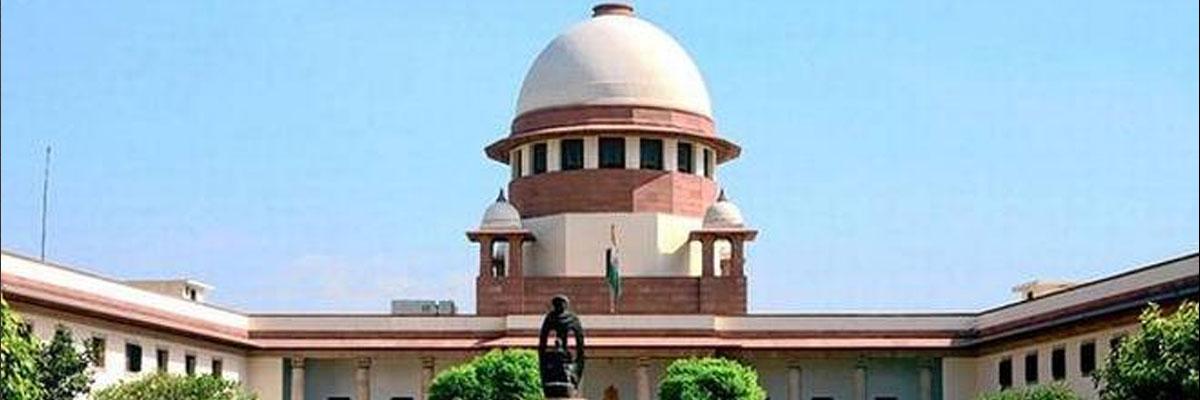Live
- I am being wrongly implicated, claims Sambhal MLA’s son Suhail Iqbal
- Gururgram: MCG imposes Rs 30.10 lakh fine against 705 people for violating GRAP norms
- PM Modi brought honour to Constitution: Karnataka BJP
- Did Cong sink MVA in Maharashtra? Data crunching throws up interesting details
- RCB's IPL 2025 Squad: Star Players, New Additions, and Exciting Leadership Change
- Sensex settles flat at 80,004, auto shares slide
- North Korea cuts power lines installed by South Korea
- Blood-like liquid on roads in Hyderabad’s Jeedimetla sparks panic
- Detrimental to interests of people: Priyanka Chaturvedi on delay in naming Maha CM
- Ecclestone, Sciver-Brunt gain big in ICC Women's T20I Player Rankings
Just In

The Supreme Court has come to the rescue of an Army man, who was dismissed from service for the offence of misconduct, saying there was a clear violation of the principle of natural justice as there was no reason to deny him the benefit of legal representation during courtmartial proceedings
New Delhi: The Supreme Court has come to the rescue of an Army man, who was dismissed from service for the offence of misconduct, saying there was a clear violation of the principle of natural justice as "there was no reason to deny him the benefit of legal representation" during court-martial proceedings.
The top court said that prejudice caused to him was evident as the Army man, who had joined service on January 1, 2003 was dismissed from the service and sentenced to six months' imprisonment after Summary Court-Martial (SCM).
A bench of Justices D Y Chandrachud and M R Shah set aside the order of December 18, 2012 of Armed Force Tribunal (AFT), Lucknow bench, and the decision taken on the basis of the Summary Court Martial.
"In the face of Army Rule 129, there was no reason to deny him the benefit of legal representation which he desired at his own expense," the court said.
The court said that there was a clear violation of the principles of natural justice as the "prejudice too is evident".
"The appellant was dismissed from service and sentenced to six months' imprisonment. Both his livelihood and liberty were taken away," the bench said while setting aside the order of AFT and the decision taken on the basis of the SCM.
The court, however, clarified that it has interfered with the order only on the ground of a violation of the principles of natural justice.
"It would be open to the Respondents (Union of India) to take further steps as may be permissible in accordance with law," it said.
The top court was hearing a plea of a sepoy who has challenged the order of AFT by which his petition challenging the decision of dismissal from service and six months jail imposed by the Summary Court Martial (SCM) was rejected.
According to sepoy's plea, a Summary Court Martial was convened on two charges--the first being of an assault on a superior officer while the second was the use of abusive language against a Subedar who had found the sepoy to be not properly dressed for the parade.
The SCM acquitted the sepoy of the second charge, but he was found guilty of the first charge of misconduct.
He was awarded a punishment of dismissal from service and six months rigorous imprisonment in civil jail.
The sepoy challenged the decision before AFT, which was later rejected.
By his letter dated July 7, 2009, the sepoy requested the Commanding Officer to permit him to hire a civil advocate.
On July 8, 2009, the request of sepoy was turned down on the ground that under Regulation 479 of the Army Regulations, a civil advocate is permissible to only those persons who are subject to trial for an offence which entails death penalty.
The bench said that Regulation 479 deals with a situation where a person, who is subject to the Army Act is to be tried for a court-martial for an offence punishable with death while on the contrary, Rule 129 of the Army Rules which specifically deals with representation in a Summary Court Martial.
"The Rule clearly indicates that in a Summary Court Martial, the accused may have a person to assist him during the trial, whether a legal adviser or any other person.
The expression 'may' must be read to mean that the person who is proceeded against has the option on whether or not to engage a legal advisor or any other person.
It represents an entitlement to be represented," the bench said.
The petitioner sepoy contended that there was a violation of the principles of natural justice in conducting the SCM as he sought the assistance of a civil advocate under Rule 129 of the Army Rules, 1954 which was denied under Regulation 479 of the Army Regulations.
The counsel for the petitioner submitted that in a Summary Court Martial, the sepoy was pitted against the Commanding Officer and he should have been given the benefit of legal advise which was denied to him on the erroneous basis that it was only for an offence involving a possible sentence of death that such assistance could be allowed.
Additional Solicitor General Pinky Anand, appearing for Union of India said no prejudice was caused to the appellant and hence, the Court may not entertain the appeal.
The bench said, "In view of the specific provision of Rule 129, the Commanding Officer was evidently in error in declining the assistance of a lawyer on the ground that legal assistance could be admissible only where the offence was punishable with death".

© 2024 Hyderabad Media House Limited/The Hans India. All rights reserved. Powered by hocalwire.com







